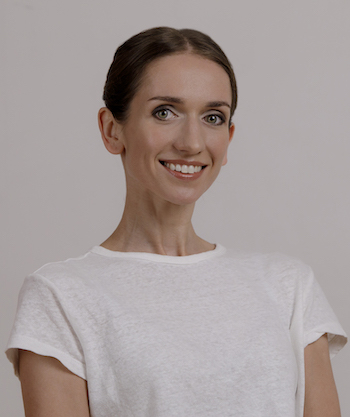
3 March 2026 19:00 | |
6 March 2026 19:00 | |
7 March 2026 19:00 | |
8 March 2026 19:00 | |
9 March 2026 19:00 | |
12 March 2026 19:00 | |
20 March 2026 19:00 | |
27 March 2026 19:00 | |
11 April 2026 19:00 |
Irina Sapozhnikova graduated from the Bashkir Choreographic College named after Rudolf Nureyev where she studied with Galina Sabirova. In 2007–2013 she worked with the ballet company of the Bashkir State Opera and Ballet Theatre.
Irina Sapozhnikova performed as part of a delegation from the Republic of Bashkortostan at a gala concert at the UNESCO headquarters (Paris, 2008).
In 2012 she performed in a gala concert celebrating the Days of Culture of the Republic of Bashkortostan in Moscow.
In 2013 Irina Sapozhnikova was awarded the title Honoured Artist of the Republic of Bashkortostan. The geographical area of her tours is wide: she has performed in Brazil, Portugal, France, Thailand, China, Mexico, Italy, Germany, The Czech Republic, Latvia, and Finland. Took part in a tour in Harbin, Beijing (The People’s Republic of China), Seoul (South Korea), Muscat (Oman), Minsk (Belarus), at the Mariinsky Theatre (St Petersburg, Vladikavkaz), at the Bolshoi Theatre (Moscow), and at the Krasnoyarsk Opera and Ballet Theatre as a member of the Ballet Company of the Primorsky Stage.
In 2013 she became a principal dancer of the Primorsky Opera and Ballet Theatre. Since 2016 she has been a principal dancer of the Ballet Company of the Primorsky Stage of the Mariinsky Theatre.
From December 2021 to May 2024 she has been a principal dancer of the Bashkir State Opera and Ballet Theatre.
Since July 2024 she has been a principal dancer of the Ballet Company of the Primorsky Stage of the Mariinsky Theatre.
Repertoire at the Primorsky Stage of the Mariinsky Theatre includes:
Don Quixote (Kitri, Queen of the Dryads); choreography by Aleksander Gorsky based on Marius Petipa’s performance,
Giselle (Giselle, Mirta); choreography by Jean Coralli, Jules Perrot and Marius Petipa,
The Sleeping Beauty (Princess Aurora, Princess Florine, the Diamond Fairy); сhoreography by Marius Petipa revised by Konstantin Sergeev, Eldar Aliev,
Swan Lake (Odette–Odile); choreography by Marius Petipa and Lev Ivanov revised choreography by Konstantin Sergeyev and choreographic adaptation by Eldar Aliev,
La Bayadère (Nikia); choreography by Marius Petipa revised by Vladimir Ponomarev and Vakhtang Chabukiani,
Carmen Suite (Carmen); choreography by Alberto Alonso,
Phaedra (Phaedra); choreography by Flemming Flindt,
Pétrouchka (the Ballerina); choreography by Michel Fokine,
La fille mal gardée (Lise); choreography by Oleg Vinogradov,
The Little Humpbacked Horse (the Tsar Maiden),
Bambi (Falina); сhoreography by Anton Pimonov.
George Balanchine’s ballets: Scotch Symphony (Soloist), Serenade, Apollo (Terpsichore).
Eldar Aliev's ballets:
The Nutcracker (the Sugar Plum Fairy),
Le Corsaire (Medora); using fragments of Marius Petipa’s choreography,
The Firebird (Firebird),
A Thousand and One Nights (Scheherezade, Nurida).
Concert numbers:
Inspiration (Soloist); choreography by Eldar Aliev,
Grand pas from Raymonda (Raymonda); choreography by Marius Petipa, Konstantin Sergeev, revised version by Eldar Aliev,
Grand pas de deux Carnevale di Venezia from Satanella (Soloist); choreography by Marius Petipa.
Repertoire аlso includes:
La fille mal gardée (Lise’s friend),
The Blue Danube (Tyrolese Dance),
Don Quixote (Variations grand pas, Kitri’s friend, Dryad-soloist),
La Bayadère (Gamzatti, Pas d’action),
Raimonda (Raimonda, Saracenic Dance),
La marionette, to the music of Igor Stravinsky (Ballerina),
The Fountain of Bakhchisarai (Young Lady),
Cinderella (Cinderella, the Prince’s Friend),
The Sleeping Beauty (Little Red Ridinghood, Carefree Fairy, Diamond, Sapphire, Gold, Silver),
The Nutcracker (Masha, Spanish Dance, Russian Dance, Chinese Dance),
Swan Lake (Spanish Bride, Pas de trois, Little Swans),
Le Corsaire (Le Jardin animé),
The Seven Beauties (Maghrebian Beauty),
Spartacus (Aegina),
Song of the Crane (Little Cranes),
Tom Sawyer (Bat, Skeletons),
Les Sylphides (11th Waltz).
Pas de deux from the ballets:
Harlequinade; choreography by Marius Petipa,
Daksophonia; choreography by Alexander Pepelyaev,
Fifteen shades of the past; choreography by Olga Daukaeva,
Adagio sostenuto (Sergei Rachmaninov (2nd Piano Concerto, Second Movement)); choreography by Konstantin Uralsky.
